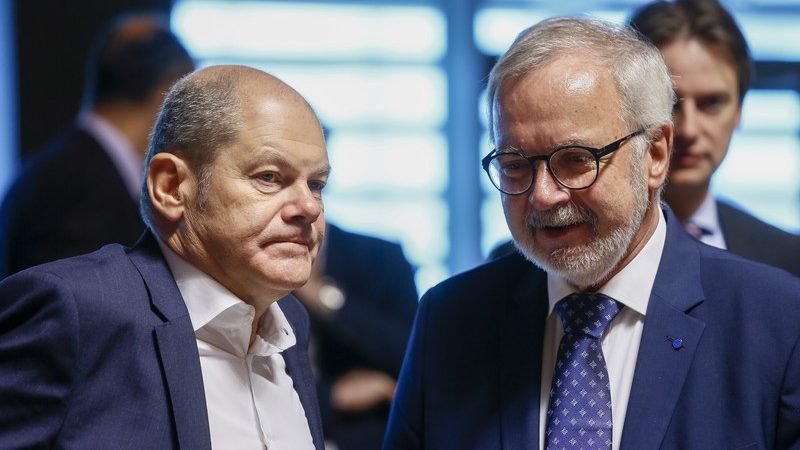The European Investment Bank decided on Tuesday (15 October) to delay a decision on updating its energy lending policy until November. Germany and the European Commission are still pushing for controversial changes to the bank’s original fossil-fuel-free proposal.

Under the EIB’s original version of its policy update, the EU lender proposed purging its extensive loan book of all fossil-fuel projects by the end of 2020. But that plan, which was hailed as “bold and necessary” by green groups, has faced resistance.
The board of directors decided today to delay a final decision until 14 November after what was called “a constructive debate”. A bank spokesperson told that “clarifications on the real nitty-gritty” of the draft are all that are needed.
Andrew McDowell, the EIB’s vice-president for energy policy, said in a statement that “I am pleased about the important progress made today and am confident of securing final approval in November.”
Decisions are normally made by consensus rather than by vote and the extension is an attempt to avoid resorting to an actual ballot, the result of which was not clear at all before today’s meeting.
A split had emerged between the bank’s zero-tolerance stance on fossil fuels, backed by countries like France, Spain and the UK, and a gas-friendly revision, supported by Germany and the European Commission. Italy is also sceptical of the EIB’s plan.
The latest draft introduces exemptions for the most efficient natural gas plants and a raft of other measures aimed to prolong support for the carbon fuel. But we understands that the 2020 deadline date is now the biggest bone of contention.
One loophole already on the table would see projects that are included on the Commission’s preferential common interest list remain eligible for funding past the 2020 date, even if they are not already officially “under appraisal”.
Sources familiar with the ongoing talks also say that an extension to the 2020 cut-off point could be made in order to convince hold-outs to support the plan.
Climate experts insist that the EIB is attempting to preserve the ethos of its original proposal but given the structure of the bank, under which the number of shares held by member states affects voting weight, compromises must be made.
That has left environmental groups nonplussed. WWF Europe’s Sébastien Godinot said “we are appalled by the backward-looking stance of Germany, the EU Commission and others. They are sabotaging the EIB’s commitment to align with the Paris Agreement.”
Civil society groups had written to EIB President Werner Hoyer ahead of today’s meeting urging the lender to put its initial draft to a vote. That was never seriously discussed, according to a bank source.
The UK is in favour of the fossil-free proposal but could be taken out of the equation if Brexit goes ahead as scheduled on 31 October. An EIB spokesperson said that the issue was not discussed at today’s meeting though.
Commission involvement
Dutch Green MEP Bas Eickhout told that “in order to make the EIB a climate bank this decision should be easy: no financial flows to fossils. Delaying this decision does not make sense.”
He added that “we fear the fossil lobby will focus on Germany and Italy to get them to push for continuing fossil subsidies. In that case [Ursula] von der Leyen’s climate neutral economy already fails before the new Commission has even started.”
The president-elect of the EU executive has indeed pledged to make the EIB a cornerstone of her green policies, by ring-fencing half of its financing for climate action. She has also promised to increase the bloc’s overall emissions-cutting efforts.
“The Commission should clean up its act, as it cannot on the one hand publicly promote its European Green Deal as a game changer and on the other object to climate commitments at the EU’s financial arm,” said Xavier Sol, head of Counter Balance, an NGO.
In the broader scheme of things, the EIB decision is a cog in ongoing attempts to drag the EU economy onto a Paris Agreement-compliant trajectory.
At the heart of that effort is a pact among member states that would see them collectively try to go carbon neutral by 2050. The Czech Republic, Hungary and Poland are the only EU countries that have not signed up to it yet.
Poland, in particular, insists that more money to wean itself off of coal power is needed before it can agree. The EIB revision would provide extra assistance to poorer EU countries but the delay could now impede ongoing negotiations.
However, an EU Council source told that the lack of a decision was not a surprise and cited the so-called Just Transition fund and link to the EU’s long-term budget as more significant factors that might make or break a deal on the 2050 plan.
Climate policy does not feature much on the agenda of the Brexit-focused October summit and EU officials are gearing up instead for serious talks at their close-of-year December summit.
EU members already agreed in June to complete their talks on the issue by the end of 2019 in order to put pen to paper on a deal early in 2020.
Final agreement is also needed for the next Commission to propose a climate law within its first 100 days, although current indications suggest that von der Leyen’s administration will miss its 1 November start date due to lack of support from MEPs.
The incoming administration could affect the outcome if it indeed does take office in time. Although the Commission does not have a vote, it does have a seat at the table and has so far played a crucial role in pushing for changes.
[Edited by Benjamin Fox]
By Sam Morgan

















